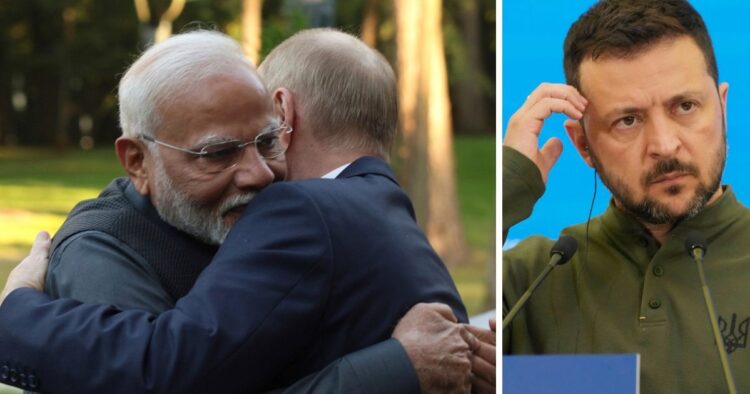Prime Minister Narendra Modi met with Russian President Vladimir Putin and emphasized that the Ukraine conflict cannot be resolved on the battlefield. Modi stressed India’s position for peace, expressing his pain over the loss of innocent lives, especially children, in the ongoing war. This meeting marked Modi’s first comments on the Russia-Ukraine war since his visit to Moscow began.
Modi shared his sorrow over the deaths of innocent children in the conflict, describing the immense pain it caused him. He discussed this with Putin, highlighting the human cost of the war. Modi reiterated that India stands for peace and is willing to work with all parties to end the conflict and restore stability in the region.
The talks between Modi and Putin came after a deadly strike on a children’s hospital in Kyiv, which Ukraine attributed to a Russian missile. Russia, however, claimed the tragedy was caused by a Ukrainian anti-missile system. Modi expressed his concern over such incidents and the need for a peaceful resolution.
During the bilateral talks, Modi and Putin discussed the historical and strategic partnership between India and Russia. Modi acknowledged Russia’s assistance in the energy sector and emphasized that stronger ties with Russia would benefit the Indian people, especially during global shortages of food, fuel, and fertilizers. He also condemned all forms of terrorism, noting India’s long-standing challenges with terrorism over the past 40 years.
Ukrainian President Volodymyr Zelenskyy criticized Modi’s visit to Russia, calling it a “huge disappointment” and a setback to peace efforts. Despite this, Modi’s visit reinforced India’s message of seeking a peaceful resolution through dialogue and diplomacy.
India has maintained a neutral stance on the Ukraine conflict, urging for a resolution through dialogue and diplomacy. Modi’s visit to Russia reiterated this position, advocating respect for the UN Charter, including territorial integrity and sovereignty. India has abstained from UN votes condemning Russia and refused to join Western sanctions, but it has expressed concerns about the conflict, particularly regarding the safety of Indian nationals recruited to fight in the war.
ALSO READ: “PM Modi Commends India-Russia Fuel Partnership, Affirms India’s Commitment to Peace”
International Criticism and G20 Summit
India’s engagement with Russia has drawn criticism from the West, which expects India to align with its stance against Russia. However, India emphasizes its long-standing strategic partnership with Russia, independent of current geopolitical tensions.
At the G20 Summit in New Delhi, the Delhi Declaration highlighted the economic impacts of the Ukraine war and called for the cessation of military destruction and attacks on critical infrastructure. It reiterated that “today’s era must not be of war” and emphasized the inadmissibility of the use or threat of nuclear weapons.
Despite the expectation that India might align with the West, given its strategic partnership with the US and its role as a counterweight to China in the Indo-Pacific region, India has maintained its strategic autonomy. India’s neutral stance on the Ukraine conflict reflects its historically cautious neutrality and its effort to balance ties with both Russia and the West amidst the crisis.

















Comments